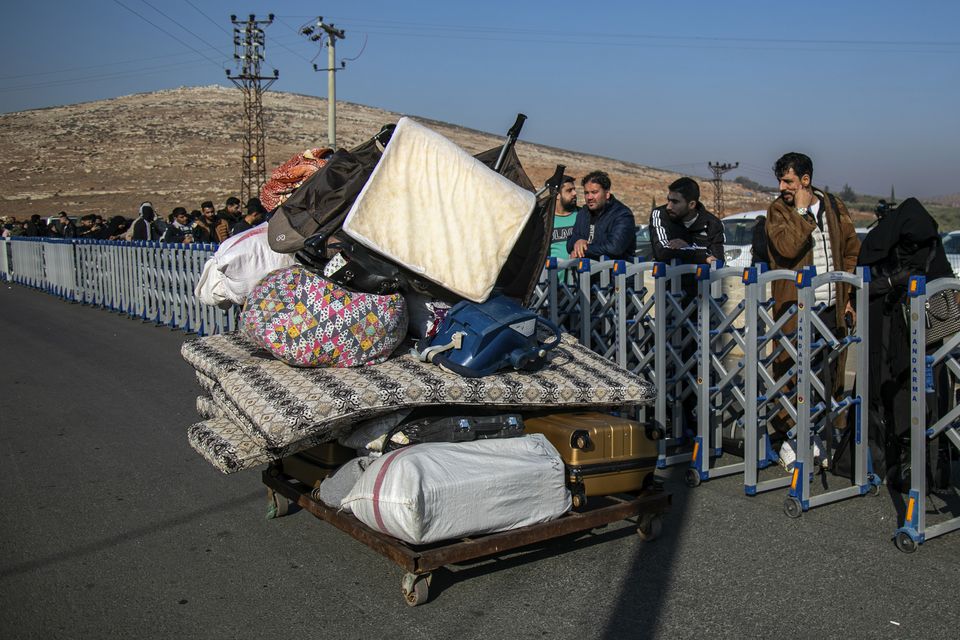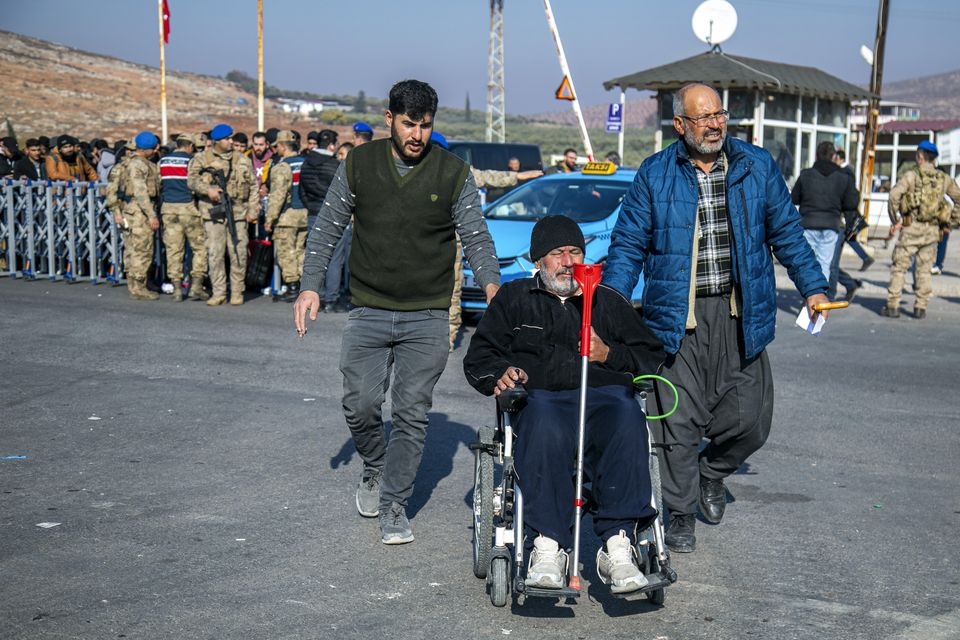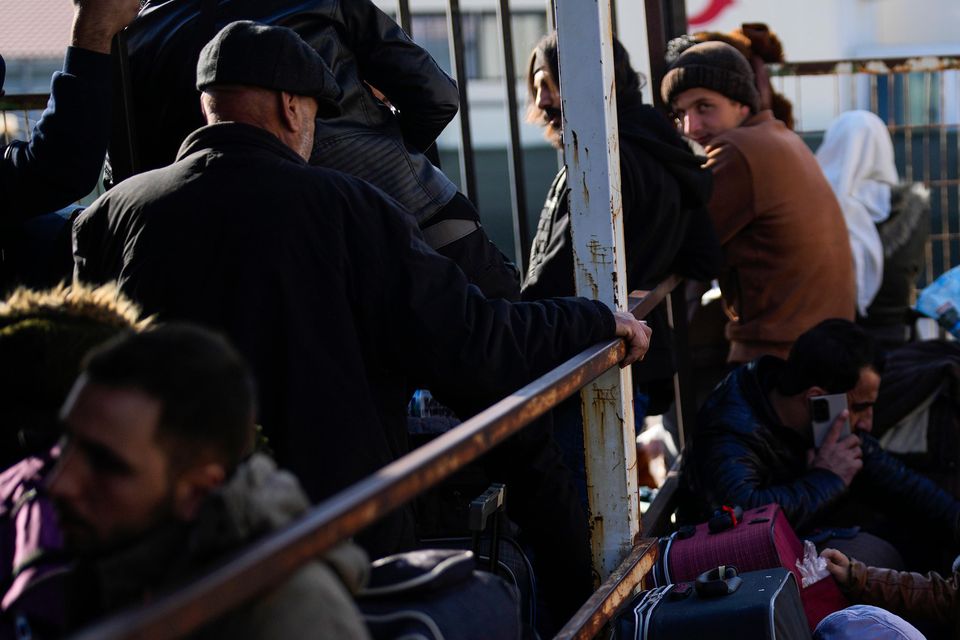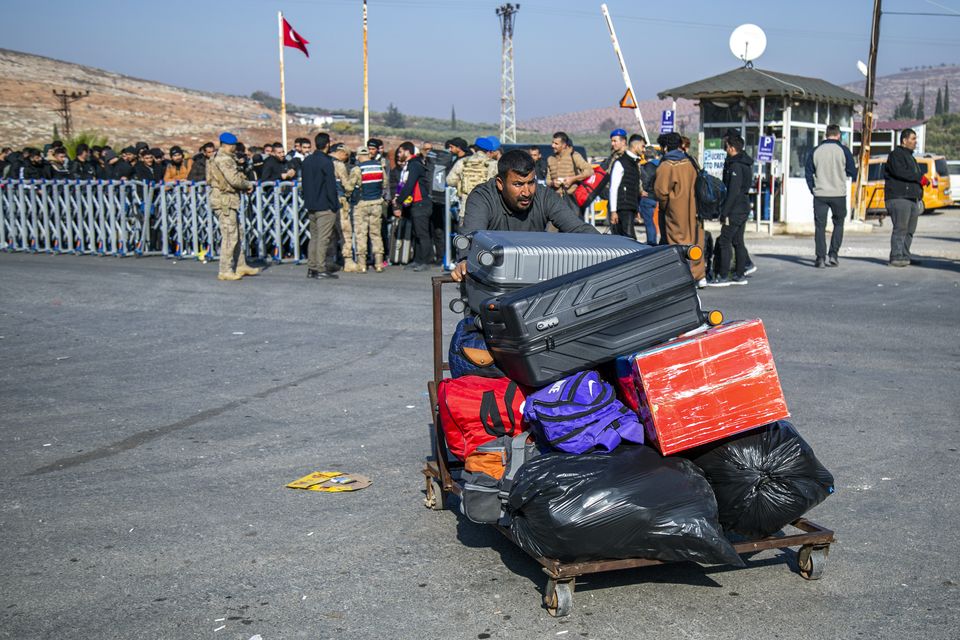Hundreds of Syrian refugees gathered at two border crossings in southern Turkey, eagerly anticipating their return home following the fall of president Bashar Assad’s government.
Many arrived at the Cilvegozu and Oncupinar border gates at daybreak, draped in blankets and coats.
Some camped by the barriers of the border crossing, warming themselves with makeshift fires or resting on the cold ground.
Syrians wait to cross into Syria from Turkey at the Cilvegozu border gate, near the town of Antakya, southern Turkey (Metin Yoksu/AP)
The border crossings correspond to the Bab al-Hawa and Bab al-Salameh gates on the Syrian side of the border.
Among those waiting at Cilvegozu was 28-year-old Muhammed Zin who voiced excitement at the prospect of returning to his homeland.
He fled Damascus in 2016 and has been living and working in Istanbul.
“Assad was shooting us, killing us,” he told the Associated Press.
“I will return to Syria now. Thank God, the war is over,” he said.
Seer Ali, 18, who left Damascus six years ago, had been working in the nearby city of Gaziantep to support his mother and siblings back home.
Syrians arrive to cross into Syria from Turkey at the Cilvegozu border gate, near the town of Antakya, southern Turkey (Metin Yoksu/AP)
“We are very happy, very happy. Not just me, but everyone, all of us Syrians here are very happy,” he said.
“Everyone will return, no one will stay here. They will all go to their families.”
Turkish officials have not said how many Syrians have returned since Mr Assad’s downfall.
Authorities set up a checkpoint some five kilometres (three miles) from Cilvegozu, only allowing Syrians with adequate documentation to advance to the border gate, HaberTurk television reported.
Mr Assad’s fall has sparked widespread joy among Turkey’s three million Syrian refugees, with many taking to the streets of Istanbul and other cities to celebrate.
On Sunday, Syrians also removed the Syrian government’s flag from the Syrian Consulate in Istanbul, replacing it with the opposition’s flag.
Syrians wait to cross into Syria from Turkey at the Oncupinar border gate, near the town of Kilis, southern Turkey (Khalil Hamra/AP)
Turkey welcomed Syrian refugees with open arms in the early years of the Syrian civil war that broke out in 2011 — becoming host to the largest number of refugees in the world.
Ankara believed that the conflict would end quickly and refugee influx would be temporary.
But as Turkey faced economic challenges, public opinion toward the refugees soured, forcing President Recep Tayyip Erdogan’s government to seek ways to ensure their safe and voluntary repatriation.
Turkish officials now hope that a significant number of Syrians will return voluntarily.
“We will continue our efforts to ensure the safe and voluntary return of Syrians and to rebuild the country,” Turkish foreign minister Hakan Fidan said on Monday.
Hundreds of displaced Syrians were also returning Monday to Syria from Lebanon, with dozens of cars lining up to enter.
Syrians arrive to cross into Syria from Turkey at the Cilvegozu border gate, near the town of Antakya, southern Turkey (Metin Yoksu/AP)
The day before, Lebanese residents had handed out congratulatory sweets to Syrians waiting to go back to their country.
Sami Abdel-Latif, a construction worker and refugee from Hama who was heading to Syria to join his wife and four children, said while the future in Syria is still uncertain, “anything is better than Bashar”.
He said he expected some chaos initially but that eventually the situation would settle down.
“Look at Aleppo now,” Mr Abdel-Latif said, referring to the first major city taken over by opposition forces more than a week ago, where life has continued more or less as normal.
He said he is also hoping that there will now be plentiful work in Syria to rebuild.
Malak Matar, who was preparing to return to Damascus, said: “This is a feeling we’ve been waiting 14 years for.”
“You feel yourself psychologically free — you can express yourself,” he said. “The country is free and the barriers have been broken down.”
Now, he said, “Syrians have to create a state that is well-organised and takes care of their country. It’s a new phase.”



